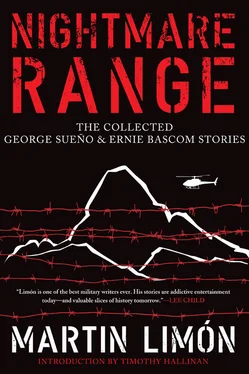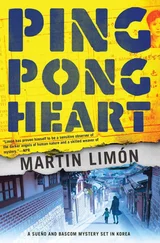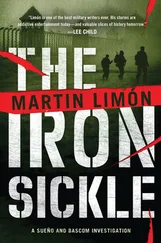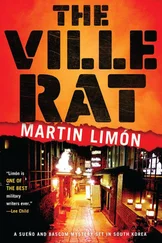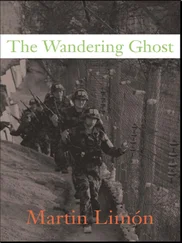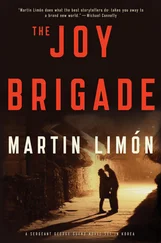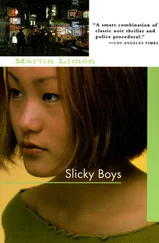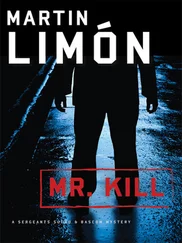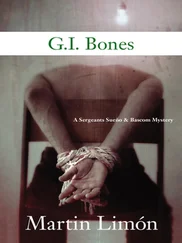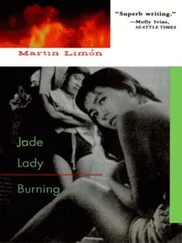Martin Limón - Nightmare Range
Здесь есть возможность читать онлайн «Martin Limón - Nightmare Range» весь текст электронной книги совершенно бесплатно (целиком полную версию без сокращений). В некоторых случаях можно слушать аудио, скачать через торрент в формате fb2 и присутствует краткое содержание. Год выпуска: 2013, ISBN: 2013, Издательство: Soho Crime, Жанр: Полицейский детектив, на английском языке. Описание произведения, (предисловие) а так же отзывы посетителей доступны на портале библиотеки ЛибКат.
- Название:Nightmare Range
- Автор:
- Издательство:Soho Crime
- Жанр:
- Год:2013
- ISBN:9781616953324
- Рейтинг книги:4 / 5. Голосов: 1
-
Избранное:Добавить в избранное
- Отзывы:
-
Ваша оценка:
- 80
- 1
- 2
- 3
- 4
- 5
Nightmare Range: краткое содержание, описание и аннотация
Предлагаем к чтению аннотацию, описание, краткое содержание или предисловие (зависит от того, что написал сам автор книги «Nightmare Range»). Если вы не нашли необходимую информацию о книге — напишите в комментариях, мы постараемся отыскать её.
Nightmare Range — читать онлайн бесплатно полную книгу (весь текст) целиком
Ниже представлен текст книги, разбитый по страницам. Система сохранения места последней прочитанной страницы, позволяет с удобством читать онлайн бесплатно книгу «Nightmare Range», без необходимости каждый раз заново искать на чём Вы остановились. Поставьте закладку, и сможете в любой момент перейти на страницу, на которой закончили чтение.
Интервал:
Закладка:
Had the bar girl heard a gunshot? No. The rock music blaring from the outside speakers that lined the narrow lane was much too loud.
Captain Rhee personally interviewed the local union leader. As an experienced cop, he knew enough to be circumspect in his questioning and didn’t press the union overly hard. There was too much power involved. Too much chance for the union and therefore all Korean employees to lose face. And, after all, how could you prove such an allegation? That a union leader had allowed a beautiful young widow to influence him and land her a better-than-average job? The union leader, however, was smart enough not to stonewall the Korean National Police completely. He confirmed to Captain Rhee that what he suspected, that the Widow Lee had received extraordinary assistance, was within the realm of possibility.
“You knew it was coming, didn’t you?” Ernie asked me.
Once again we were sitting in the 8th Army snack bar on the morning after the Widow Lee was convicted of the murder of her husband and Sergeant Dubrovnik.
“I guess I knew. Somewhere. But I didn’t want to know.”
“I don’t blame you.” Ernie nibbled on his bacon, lettuce, and tomato sandwich. “She was a good looking woman.”
I sighed.
“Unlucky in love,” Ernie said.
“You got that right.”
“You could’ve gone along with the plan,” Ernie told me. “Made some money for yourself. And you’d still have her.”
I set my coffee down and looked into his green eyes. “I never thought of that.”
“Sure you didn’t,” he said.
THE OPPOSITE OF O
“Never the twain shall meet,” a wise man once said.
He was referring to the Occident and the Orient but as a criminal investigator for the 8th United States Army in Seoul, Republic of Korea, I can assure you that the two worlds often meet. And in the case of Private First Class Everett P. Rothenberg and Miss O Sung-hee, the two worlds collided at the intersection of warm flesh and the cold, sharpened tip of an Army-issue bayonet.
Ernie and I were dispatched from 8th Army Headquarters as soon as we received word about a stabbing near Camp Colbern, a communications compound located in the countryside some eighteen miles east of the teeming metropolis of Seoul.
Paldang-ni was the name of the village. It clings to the side of the gently-sloping foothills of the Kumdang Mountains just below the brick and barbed wire enclosure that surrounds Camp Colbern. The roads were narrow and farmers pushed wooden carts piled high with winter turnips and old women in short blouses and long skirts balanced huge bundles of laundry atop their heads. Ernie drove slowly through the busy lanes, avoiding splashing mud on the industrious pedestrians. Not because Ernie Bascom was a polite kind of guy but because he wasn’t quite sure where, in this convoluted maze of alleys, we would find the road that led to the Paldang Station of the Korean National Police.
Above a whitewashed building, the flag of Daehan Minguk , the Republic of Korea, fluttered in the cold morning breeze. The yin and the yang symbols clung to one another, red and blue teardrops embracing on a field of pure white. Ernie parked the jeep out front and together we strode into the station. Five minutes later we were interrogating a prisoner: a thin and very nervous young man by the name of Private First Class Everett P. Rothenberg.
“They were sisters,” Private Rothenberg told us.
“Who?” Ernie asked.
“Miss O. And the woman she shared a hooch with, Miss Kang.”
“Sisters?”
“Yeah.”
Ernie crossed his arms and stared skeptically at Rothenberg. Rothenberg, for his part, allowed long forearms to hang listlessly over bony legs. The three-legged stool he sat upon was too low for him and his spine curved forward and his head bobbed. He looked like a man who’d abandoned any hope of receiving a fair shake.
“Didn’t it ever trouble you,” Ernie asked, “that the two women had different last names?”
Rothenberg shrugged bony shoulders. “I figured they had different fathers or something.”
I asked the main question. “Why’d you kill her, Rothenberg?”
He tilted his head toward me and his moist blue eyes became larger and rounder. “You don’t believe me, do you?”
“What’s to believe? You haven’t told us anything one way or the other.”
“I told them .” He pointed to the three khaki-clad Korean National Policemen standing outside the cement-walled interrogation room. Their arms were crossed, fists clenched, narrow eyes lit with malice. Rays from a single electric bulb illuminated the interrogation room, revealing cobwebs and dried rat feces in unswept corners.
“What’d you tell the KNPs?” I asked.
“I told them I couldn’t have killed Miss O.”
“Why not?”
Rothenberg, once again, allowed his head to hang loosely on his long neck. “Because I love her,” he said.
Ernie smirked. Virtually every young GI who arrives in Korea and finds his first yobo down in the ville falls in love. The US Army is so used to this phenomenon that they require eight months’ worth of paperwork for an American GI to marry a Korean woman. What with a twelve-month tour of duty, a GI has to fall in love early and hard to be allowed permission to marry. Why all the hassles? Simple. To protect innocent young American GIs from the sinister wiles of Asian dragon ladies. At least, that’s the official rationale. The real reason is flat-out racism.
“Where were you last night, Rothenberg?”
“You mean after curfew?”
“Yes. But let’s start from the beginning. What time did you leave work?”
I dragged another wooden stool from against the wall of the interrogation room and sat down opposite Private First Class Everett P. Rothenberg. I pulled out my pocket notebook and my ballpoint pen and prepared to write. Rothenberg started talking.
Ernie leaned against the cement wall, arms crossed, and continued to smirk. The KNPs continued to glare. A spider found its web and slowly crawled toward a quivering moth.
Our first stop was the Full Moon Teahouse.
Miss O had worked here. And, according to Rothenberg, she was the toast of the town, the tallest, most shapely, and best looking business girl in the village of Paldang-ni. The front door was covered with a brightly painted façade; a replica of a gateway to an ancient imperial palace. The heavy wooden door was locked. Ernie and I strolled around back. Here the setting was more real. Piled cases of empty soju bottles, plastic-wrapped garbage rotting in rusty metal cans, a long-tailed rat scurrying down a vented drainage ditch.
The back door was open. Ernie and I walked in. The odor of ammonia and soapy water assaulted our nostrils. After a short hallway, light from a red bulb guided us into the main serving room. Wooden tables with straight-backed chairs covered most of the floor. Cushioned booths lined the walls and behind a serving counter a youngish-looking Korean woman sat beneath a green-shaded lamp, laboring over heavy accounting ledgers. When she saw us, she pulled off her horn-rimmed glasses and stared, mouth agape.
I flashed my ID. Ernie found a switch and overhead fluorescent bulbs buzzed to life. The woman stared at my Criminal Investigation badge and finally said, “ Weikurei nonun ?” No bow. No polite verb endings. Just asking me what I wanted. A Korean cop would’ve popped her in the jaw. Being a tolerant Westerner, I shrugged off the insult.
“What we’re doing here,” I said, “is we want to talk to Miss Kang Mi-ryul.”
She touched the tip of her forefinger to her nose. A hand gesture not used in the West. She was saying, that’s me. I started to explain why we were there but she’d already guessed. She said, “Miss O,” and pulled out a handkerchief. After a few tears, she calmed down and started to talk. In Korean. Telling me all about her glorious and gorgeous friend, the late O Sung-hee. About Miss O’s amorous conquests, about the job offers from other teahouse and bar owners in town, about the men-both Korean and American-who constantly pursued her.
Читать дальшеИнтервал:
Закладка:
Похожие книги на «Nightmare Range»
Представляем Вашему вниманию похожие книги на «Nightmare Range» списком для выбора. Мы отобрали схожую по названию и смыслу литературу в надежде предоставить читателям больше вариантов отыскать новые, интересные, ещё непрочитанные произведения.
Обсуждение, отзывы о книге «Nightmare Range» и просто собственные мнения читателей. Оставьте ваши комментарии, напишите, что Вы думаете о произведении, его смысле или главных героях. Укажите что конкретно понравилось, а что нет, и почему Вы так считаете.
